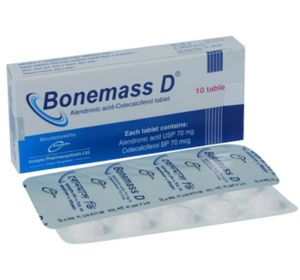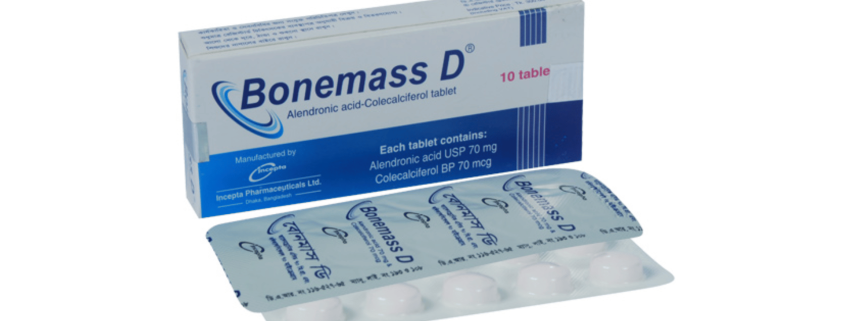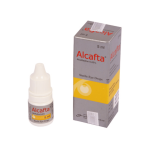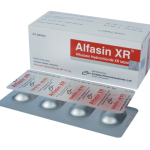Bonemass D(Alendronate & Colecalciferol)

Therapeutic Group: Bone and Joint Disorder
Presentation
Bonemass D: Each tablet contains Alendronate monosodium trihydrate USP equivalent to 70 mg of Alendronic acid, and Colecalciferol BP 70 mcg equivalent to 2800 International Units (IUs).
Description
Alendronate Sodium is a bisphosphonate that acts as a specific inhibitor of osteoclast-mediated bone resorption. Colecalciferol (vitamin D3) is a secosterol that is the natural precursor of the Calcium-regulating hormone Calcitriol (1,25-dihydroxy vitamin D3).
Indications
Bonemass D is indicated for the treatment of osteoporosis in postmenopausal women and to increase bonemass in men with osteoporosis. Bonemass D alone should not be used to treat vitamin D deficiency.
Dosage & Administration
Treatment of osteoporosis in postmenopausal women: One tablet once weekly.
Treatment to increase bonemass in men with osteoporosis: One tablet once weekly.
Dosing in elderly and renal insufficiency: No dosage adjustment is necessary for the elderly or for patients with mild-to-moderate renal insufficiency (creatinine clearance 35 to 60 mL/min). Bonemass D is not recommended for patients with more severe renal insufficiency (creatinine clearance <35 mL/min) due to lack of experience.
Bonemass D must be taken at least one to half hour before the first food, beverage, or medication of the day with plain water only. Other beverages (including mineral water), food, and some medications are likely to reduce the absorption of Alendronate. To facilitate delivery to the stomach and thus reduce the potential for esophageal irritation, Bonemass D should only be swallowed upon arising for the day with a full glass of water and patients should not lie down for at least 30 minutes and until after their first food of the day. Bonemass D should not be taken at bedtime.
Side Effects
The most common side-effect is digestive reactions from Bonemass D. These reactions include irritation, inflammation, or ulcers of the esophagus, which may sometimes bleed. This may occur especially if patients do not drink a full glass of water with Bonemass D or if they lie down in less than 30 minutes or before their first food of the day. Less common side-effects are nausea, vomiting, a full or bloated feeling in the stomach, constipation, diarrhea, black or bloody stools, gas, headache, a changed sense of taste, and bone, muscle, or joint pain.
Precautions
Alendronate Sodium: Hypocalcemia must be corrected before initiating therapy with Bonemass D. Other disorders affecting mineral metabolism (such as vitamin D deficiency) should also be effectively treated. In patients with these conditions, serum calcium and symptoms of hypocalcemia should be monitored during therapy with Bonemass D.
Colecalciferol: Bonemass D alone should not be used to treat vitamin D deficiency. Patients at increased risk for vitamin D insufficiency (e.g. those who are nursing home bound, chronically ill, over the age of 70 years) should receive vitamin D supplementation in addition to that provided in Bonemass D.
Use in Pregnancy & Lactation
There is no studies in pregnant women. Bonemass D should be used during pregnancy only if the potential benefit justifies the potential risk to the mother and fetus. Colecalciferol and some of its active metabolites pass into breast milk. It is not known whether Alendronate is excreted in human milk. Because many drugs are excreted in human milk, caution should be exercised when Bonemass D is administered to nursing women. Bonemass D is not indicated for use in children.
Over Dose
Alendronate Sodium: No specific information is available on the treatment of overdosage with Alendronate. Hypocalcemia, hypophosphatemia, and upper gastrointestinal adverse events, such as upset stomach, heartburn, esophagitis, gastritis, or ulcer, may result from oral overdosage. Milk or Antacids should be given to bind Alendronate. Due to the risk of esophageal irritation, vomiting should not be induced and the patient should remain fully upright.
Colecalciferol: There is limited information regarding overdosage of Colecalciferol associated with acute toxicity. Signs and symptoms of vitamin D toxicity include hypercalcemia, hypercalciuria, anorexia, nausea, vomiting, polyuria, polydipsia, weakness, and lethargy. Serum and urine calcium levels should be monitored in patients with suspected vitamin D toxicity. Standard therapy includes restriction of dietary calcium, hydration, and systemic glucocorticoids in patients with severe hypercalcemia.
Storage
Bonemass D tablet should be stored at 20-25 °C. Protect from moisture and light.
Commercial Pack
Bonemass D: Each box contains 1 blister strip of 10 tablets.



